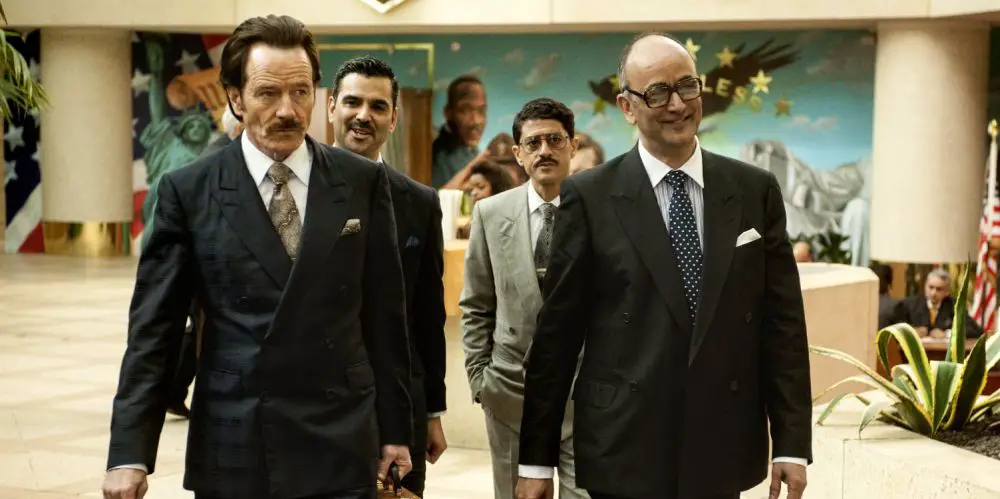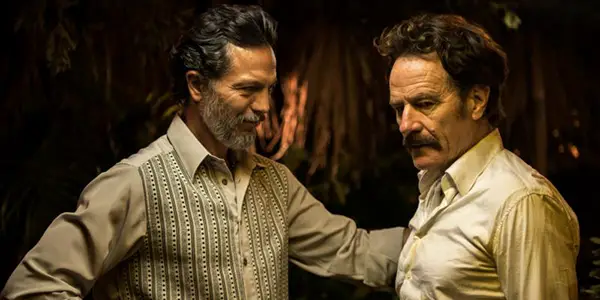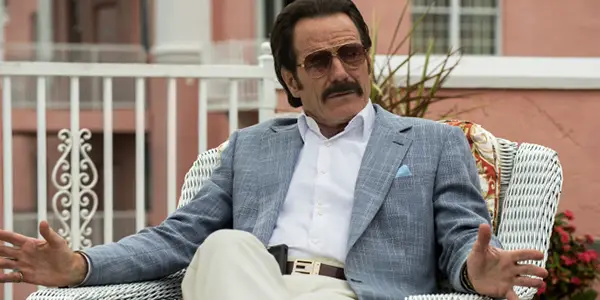THE INFILTRATOR: A Flawed Crime Drama Still Worth Your Time

David is a film aficionado from Colchester, Connecticut. He enjoys…
In recent years, the gangster film seems to be a stale genre, with a majority of the films lacking any distinctive qualities. Last year’s Black Mass is a prime example, with the only really memorable aspect of the film being Johnny Depp‘s performance.
Viewed against this backdrop, then, The Infiltrator just manages to stand out amongst modern films. Bolstered by a strong cast and an engaging, based on true events story, it is a surprisingly enjoyable experience.
Balanced first half that falters halfway through
The Infiltrator takes place in the 1980s during the onset of Reagan’s War on Drugs. In order to catch the highest drug lords and to build enough evidence against them, special agents take undercover cases in order to infiltrate their organizations.
Robert Mazur (Bryan Cranston) creates the alias Bob Musella, and with the fake background of a wealthy businessman behind him, attempts to swindle gangsters into laundering money with his organization. Emir Abreu (John Leguizamo) is Robert’s partner, who also has an in with several prominent drug lords.
The first half of The Infiltrator meanders at a reasonable pace. The dynamic between Cranston‘s Robert and Leguizamo‘s Abreu creates an interesting contrast, with Cranston‘s character being very particular and cautious, while Leguizamo simply throws himself into the role, doing whatever it takes to convince people that he is one of them.
However, about halfway through the film, this dynamic starts to shift and you see more of each individual character on their own rather than together. While it didn’t seem essential for the two characters to have to spend every scene together, since such an aspect would make the film more of a buddy comedy, yet to see their strong chemistry from the start only to have it missing for the remainder of the film was a bit of a letdown.

Also about halfway through The Infiltrator, the editing of the film started to get noticeably choppy. Whereas before, they had shown the reasons for scenes to exist and there were adequate transitions between them, now it took a few minutes to decipher just exactly why a character is in a certain place and who these other people around them are.
An example of this is when Robert is suddenly seen tied up in the back of a car, yet only seconds before he was simply sitting in his office. Thankfully, though, this abruptness only happens for a few key scenes, and the film starts to even out by the end.
Despite the choppiness, there are some admirable cinematography choices here by director of photography Joshua Reis; for example, transitions from one scene to the next using the fade in/overlap technique. It’s not so frequently used that you would celebrate the film for its artistry, but it is enough to at least distinguish it slightly from the far more forgettable mob films out there, such as the aforementioned Black Mass.
The Undercover Cop Sub-Genre
There are inklings of informant and mob-related films that clearly influenced The Infiltrator; you may think of Martin Scorsese‘s The Departed or especially Mike Newell’s Donnie Brasco. A similar theme underlying all these films is the idea that, even though you are getting to know people who are seen as harmful criminals, it is still possible to see them as people and to develop genuine compassion for them.
For example, the scenes between Robert and a criminal named Roberto Alcaino (Benjamin Bratt) are very well orchestrated, and the two become close through Robert’s attempted infiltration. You really gain a sense by the end that this is a person who simply chose crime as his profession as opposed to someone who is deliberately just not caring enough to obey the law. Such an idea also raises the ethical question of being an informant, in that by becoming close to people you still have to turn them in by the end.

Much of the success of The Infiltrator is thanks to not only Brad Furman‘s careful direction, but the central performance by Bryan Cranston. Though people are still likely to associate Cranston with his career-defining role in Breaking Bad, here he manages to separate himself from it in a very interesting way.
Though still of the crime genre, in this film Cranston gets to play both sides. In real life, he is just an ordinary man, working to support his wife and family, while in the criminal world he must make a name for himself as ruthless businessman Bob Musella. Essentially, Cranston is a giving a performance within a performance, and rather than simply fall back on his Walter White persona, he distinguishes Robert by truly showing the weight and strain that he endures while working undercover. At times, Robert even falters and slips while playing Bob Musella, giving a realistic dynamic to the performance.
Rounding out the cast are the aforementioned John Leguizamo, who admirably plays Cranston’s undercover partner, and also Diane Kruger, who plays Kathy Ertz, a woman that is hired as Robert’s fake fiancé in order to lend more credence to Bob Musella’s business profile.
Violent and Ruthless
Unfortunately, there are also some aspects of The Infiltrator that fall back on many modern gangster film flaws. One of the reasons that Black Mass was so ordinary was the story’s attempt to raise the tension level by deliberately throwing in scenes of unexpected violence whenever the story seemed to get stale.
While violence and blood are expected in any film that concerns drug cartels, in both films it seems to be simply shoehorned into the stories in an effort to make them more tense. In reality, though, simply the way that The Infiltrator was shot was tense enough, without the need for sudden explosions of violence.

An example where the tenseness of the film is greatly heightened is during some of the scenes where Robert is undercover, and you see closeup shots of the tape recorder located in his briefcase, or an almost unassuming glance by one of the other gangsters; there is almost no moment when you aren’t afraid that he is about to be discovered. On their own, these scenes are cleverly shot and suitably tense.
Conclusion
Overall, The Infiltrator is a tense, entertaining, mostly enjoyable couple hours at the movies.
It may not be remembered some time from now or likely be on any top list by the end of the year, but for the sheer limited amount of crime dramas that are actually passable (in addition to observing yet another remarkable performance by Bryan Cranston), I’d say that the film is worth your time.
What are some of your favorite modern gangster films?
The Infiltrator is open now in the United States and will open in the UK on September 16. For all international release dates, see here.
Does content like this matter to you?
Become a Member and support film journalism. Unlock access to all of Film Inquiry`s great articles. Join a community of like-minded readers who are passionate about cinema - get access to our private members Network, give back to independent filmmakers, and more.
David is a film aficionado from Colchester, Connecticut. He enjoys writing, reading, analyzing, and of course, watching movies. His favorite genres are westerns, crime dramas, horror, and sci-fis. He also enjoys binge-watching TV shows on Netflix.













